#i only have 3 characters at max bond and its pavia zima and dikke LMFAO
Text

;R1999 DIKKE - General Headcanons

Compilation of headcanons and analysis on Dikke as a character and other related things.

as promised, here's the Dikke post where I go deranged talking about her, since it was one of the two with the most votes in the poll <3
the other popular result was to talk about the parallels and use of racial issues within the story, how the game replaces actual racism for fantasy racism (arcanists vs humans) - so that one will deffo take me some time!

On the subject of justice and Dikke's inspirations.
I've seen some people say that Dikke is based on Joan of Arc, given her righteousness and religious themes - but there are so many more details about her design that point toward other figures!
Like, really. A lot of references to law and deities of justice all throughout history and different cultures.
The most obvious one is Dike, "goddess of justice and the spirit of moral order and fair judgement". In Dikke's interview with Pandora Wilson, they literally address her as "the goddess of justice". And a small statue of Lady Justice, the personification of justice that originates from Justitia (roman equivalent of Dike) can be seen in her insight 2 garment.

It goes without saying that Dikke's sword is another symbol representative of the previously mentioned figures - but to have only the sword and not the scales could have some implications about her way of imparting justice.
I would like to point out that Dikke's sword has these two dangling pieces that allude to the scales she's missing in her design. And sure, it might be a reach, but given how much detail and thought goes into the characters of the game and their designs, I really believe this is the case!
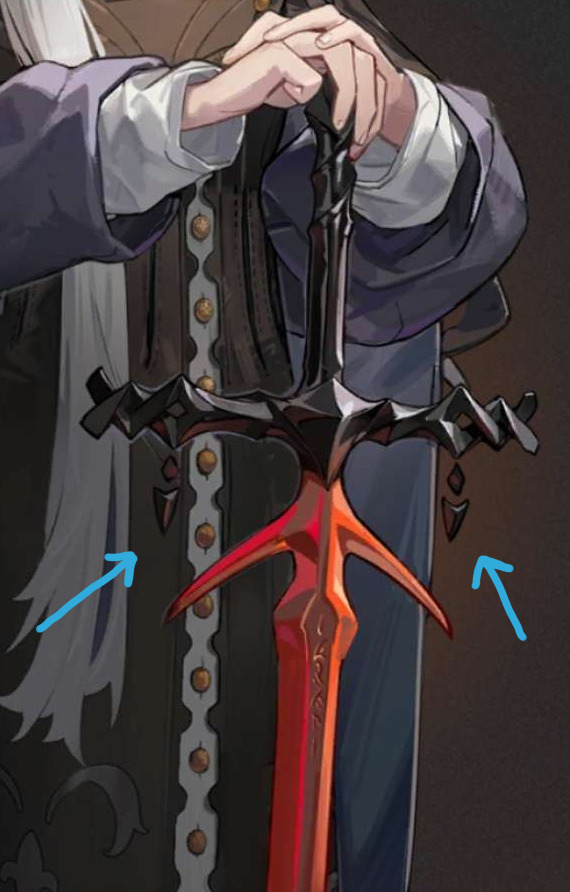
On Dikke's items, we also get the name and description for the sword.
The name alone leads me to believe that Dikke's weapon and its design represents both the sword and the scales of Lady Justice, it's the totality of justice itself. Dikke WIELDS justice, she ENFORCES justice, she IS justice. You're going to get really tired of me repeating the word justice in this post, but bear with me!
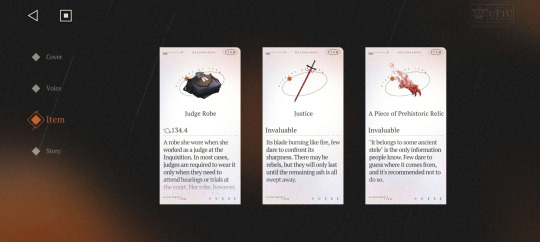
On the subject of swords, there are two swords mentioned all throughout Dikke's in-game profile and information. Her insight 2 garment is titled "Sword of Hamurabi".
This is evocative of something called the "Code of Hammurabi", one of the longest legal texts dating back to the first dynasty of Babylon. According to wikipedia, this stele it also depicts yet another deity of justice, Shamash. Wikipedia also makes note of the prologue within the Code of Hammurabi, in which the author - Hammurabi - claims to have been given these rules "to prevent the strong from oppressing the weak". This is extremely relevant to Dikke, as someone who fought hard for the rights of arcanists.
Pandora Wilson: I have heard many legends about you. The violent ghost of punishment, the crime-slaying sword of execution, the goddess of justice, the people's savior...
Dikke: The desperate always need hope.
The stele of the Code of Hammurabi is ALSO relevant, because the artifact that follows Dikke around explicitly "belongs to some ancient stele". Yet another object that embodies justice and law.
I won't pretend I know anything about Babylonian culture or history in general, so anyone with more insight on this is welcome to add on to details and corrections!
The second sword mentioned can be found in the title for her 02 Story - "The Sword of Damocles".
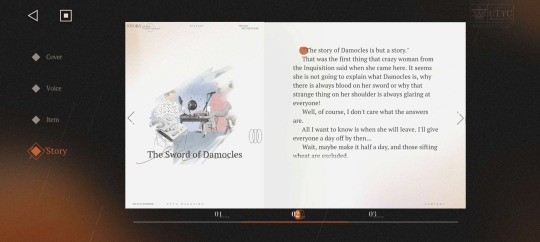
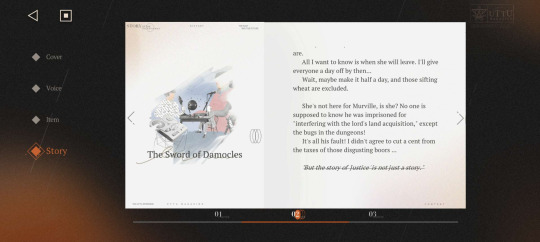
This excerpt seems to be written by one of Dikke's coworkers, perhaps someone in a higher position of power since they mention being able to give others a day off. Overall, we're reading the thoughts of someone who is abusing their power and who does not think highly of Dikke.
"The story of Damocles is but a story" is something that Dikke herself says. At the end, there's a different phrase written and crossed out - "But the story of justice is not just a story".
Now, the anecdote of Damocles talks about how positions of authority and power are double-edged swords - a king may have all the riches and fortune in the world, but also be burdened with the anxiety of knowing there might be someone plotting against him. In the story, Damocles switches places with king Dionysus, to know what it's like to be a king, but to really make Damocles understand the position of king, a sword is placed above him - one that can fall and kill him at any moment.
With this in mind, Dikke's 02 Story becomes more clear - the first phrase is a warning given by Dikke herself to those in positions of power. The story of Damocles is a story, because not everyone will understand the consequences of being in a position of power. Not everyone will be given the opportunity to even reach such a position.
The author of the 02 Story is not a good person, only considering the idea of giving people HALF a day off, excluding those who work on the fields who will get nothing, refusing to lower taxes for the poor, and imprisoning someone who "interfered with the lord's land acquisition".
The sword of Damocles is also used to allude to the impending tragedy for those in positions of power, caused by the smallest of catalysts. So it makes sense to me that the final phrase, the one crossed out at the end, was either written by Dikke or alludes to the demise of this author at her hand.
And while we're at it, might as well talk about the last remaining item - her robes. Judges are required to wear these when working on trials, but Dikke is specifically stated to wear them outside of them - because she's always imparting justice. She's the opposite of Oliver Fog, she's always on the clock.
We haven't even gotten to another big aspect of Dikke's character - the fact that she's part of the Inquisition.
Without getting too much into actual historical events, the Inquisition as we know it focused on heresy and the conversion and persecution of Jews and Muslims. Within the game, this is recontextualized as a focus for arcanists instead. It's worth noting that her 01 and 02 Stories are written from the perspective of those who are in support of the Inquisition and its practices, or who profit from abusing their own power - hence the wording of "the Inquisition has been abused and considered evil by the ignorant."
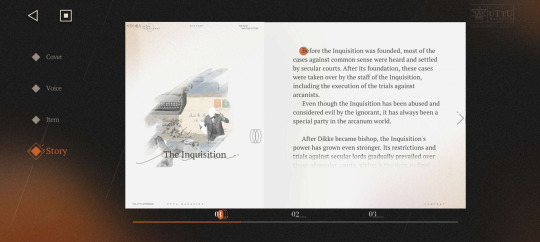
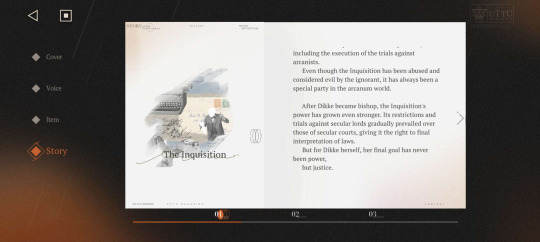
There is an emphasis on how the Inquisition seeks power, while Dikke's final goal is justice.
This whole thing and yet another part from her interview with Pandora Wilson, is related to how Dikke associates herself with the corrupt and allows people to view her as a needlessly violent person for the sake of setting things right. On one hand, she could associate with the Inquisition and become a bishop to destroy corruption from inside out - on the other, she could acknowledge that to impart justice, one needs power because they're things that go hand in hand. The Inquisition is only able to have this much influence over trials for arcanists because of the common hatred towards arcanists throughout history.
The interview revolves around all the rumours surrounding Dikke, and we can see her showing distaste at the idea of cooperating with "what [she] shouldn't allow for the sake of justice" while at the same time, not denying her involvement with them. All the things she does are a means to an end.
Pandora Wilson: Does that mean you will cooperate with what you shouldn't allow for the sake of "justice"?
Dikke: Fie.
Pandora Wilson: Is that supposed to be a secret?
Dikke: It sounds like we are talking about a conspiracy, yet it is but a means.
As for Dikke's own relationship with justice and her personal views outside of all the historical references used to create her character, I think this voiceline she has pretty much sums things up nicely.
Everything I doth… is so I may enjoy this calm wind on nights like this, rather than hear the sorrowful cries and moans of unhappiness.
She's a character that is strict in her ways and doesn't shy away from the darker aspects of life, such as the injustice arcanists have been subjected to for centuries. This extreme focus she has for upholding justice does cause Dikke to appear cold, and yet her ideals are almost childish, pure even - a world in which all misdeeds are punished and all good people are heard. Hell, her Ultimate literally purifies all negative statuses.
Dikke could easily lean towards righteous characters who exclusively see things as black or white, yet many of her voicelines and the origin of her devotion, show a very gentle heart. This is made clear by the fact that she's a healer.
Her two attacks and their names speak volumes about her own ways of thinking. Power is violent, power is not something that a judge should have so carelessly, but it is allowed in the name of "justice". Justice in quotations.
And then, actual justice is a rare occurrence, being merciful is not something that rules and the law take into account, but it's needed for those who cannot defend themselves.
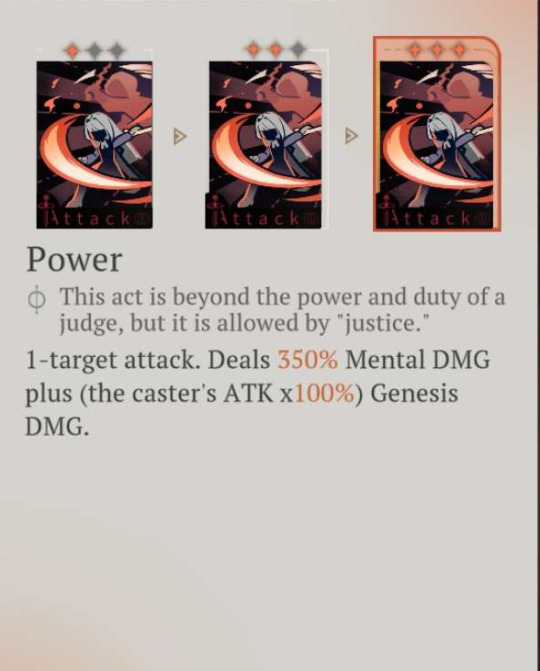

On the subject of Dikke's backstory.
There's no resolution to this point, it just came up randomly while writing the previous one, because it just hit me that Dikke's Cover profile does not list where she was born. And that got me thinking about the fact that before settling down, she traveled all around Europe.
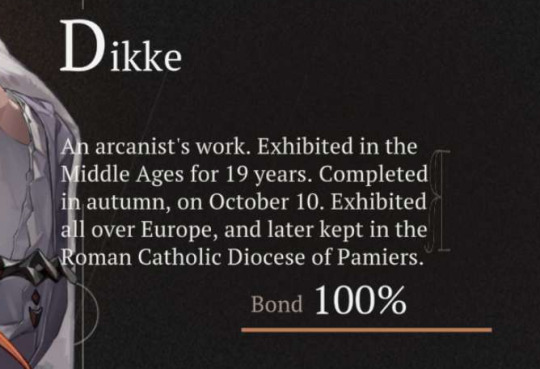
First of all, the Roman Catholic Diocese of Pamiers is an extremely specific location - one that has ties to the Inquisition, as a very important document regarding the Inquisition's procedures during a very specific trial was found there, as far as I know with my surface level research into history references. This document also talked about how, within this trial, the inquisitor and the bishop had "almost equal responsibility".
We can assume that this is the place where Dikke became bishop officially, if this was her final destination.
This starts to fall within headcanon territory, since it's mostly speculation, but I feel that the 02 Story takes place before she becomes bishop and settles in Pamiers - as a member of the inquisiton, she must've traveled all over Europe to do her job.
There might also be something related to the name mentioned, "Murville", but I don't have time nor the brain to start connecting the dots with actual french history. All in all, I like to think that Dikke was given the position of bishop as an attempt to distance her from, you know, killing every single corrupt person in a position of power by keeping her in a single place.
None of her voicelines give away anything about her life prior her entire journey of justice, as far as I can tell.
If we take Dikke's ties with Joan of Arc, maybe she was a common girl roped into things beyond her control. But I personally don't like the interpretation of Dikke's ideals being born from divine intervention instead of her own experiences, seeing the crimes committed against arcanists and realizing that she would like to do something about it.
Another option I'd like to explore about her background - maybe Dikke did have a relatively safe and normal childhood, away from the stigma and persecution. A nice, gentle life that she willingly gave up after she was confronted with the reality of the state of the world, without Jean of Arc's holy realization. To me, there needs to be an emphasis on Dikke's choice and decision to fight corruption. Making this dedication a result of "God told me to do this" would render her a little shallow - not to say religion cannot be part of her character, but in my opinion, Dikke is best when the focus of her moral compass is a genuinely care for the weak and the defenseless.
On the subject of Dikke and the loss of humanity.
Yes, that's THREE characters in a row that I analyze and that have themes of loss of humanity. There's just so many characters who've lost or given up their own humanity for the sake of something greater or something wicked.
Pavia's was a result of how he was mistreated and as a way to reclaim power, Forget Me Not's was a self-imposed torture originating from his inability to take responsibility. Dikke's seems to be self-imposed as well, but unlike the previous two, her loss of humanity is more of a sacrifice she makes for the greater good.
In her voicelines, we see that she leads a very strict schedule - she's straightforward and curt (but never impolite!) with Vertin, alluding to how simple justice is (if one commits a crime or abuses power, they shall be dealt with regardless of their social status) and how her body is "a representation of justice". Dikke has become a symbol for an idea, the concept of a fair system - she is no longer an individual but a savior, an executioner, a violent ghost, a witch, a threat, etc etc.
The loss of humanity is obvious in the way we do not get to know Dikke outside of any themes regarding justice. It's extremely hard to gleam any information about her childhood, her family, her interests and so on because they've all been displaced by this identity as justice itself. To me, this speaks about how power and responsibility on this scale will inevitably separate you from the people, THIS is the Sword of Damocles, now applied to Dikke as much as it applies to those in line for her judgement.
And yet, there are still very small hints of humanity left within her (still related, in a way, to her goals) in her care for the weak. Dikke's quote on her hobbies in a way reminds me of Sonetto.
The idle chatter of the people is entertaining, but 'tis more entertaining that they are always the first to know about the corrupt behavior of nobles.
Sonetto is a character that is similar to Dikke, in the sense that they both became the embodiment of concepts that ultimately stripped them off their individuality. Sonetto by fulfilling her training at the Foundation and becoming the PERFECT example of a military dog, a child martyr who struggles to connect with others because she was only taught how to exist FOR the Foundation. And Dikke, by all the things mentioned before.
But both of them have very endearing hobbies. Sonetto reads newspapers and collects them to find TYPOS IN THEM. Dikke's hobby is to listen to people talk as they go on about their day, not gossiping but to just listen to people exist.
In the main story, Sonetto's upbringing causes her to have a barrier with the people she truly wants to connect to (Vertin, namely) and Dikke's goal causes her life to revolve around a single thing, now only able to engage in mundane things from an outsider's perspective. She listens to people, she doesn't talk to them. She protects people, she doesn't live among them.
I like to think that, even so, this is when Dikke is most at peace. That she enjoys people watching, knowing they're safe and sound - because it validates all her efforts, it means that what she's doing is, in the end, worth it. This might also be why Dikke tells Vertin that they might be on the same path - Vertin, slowly figuring out the truth behind the Foundation and Manus Vindictae and acting as a saviour for those stuck in the middle.
As for headcanons, here's a couple I have!
Dikke has such a dry and deadpan sense of humour that only Vertin can understand it.
Sometimes, very rarely, Dikke will chime in with the most outlandish reply - straight out of the blue, spoken in the most serious and monotone voice. Those who aren't close to her will most likely brush it off as yet another intimidating thing they can't understand about her, but those close to her like Vertin?
It's THE funniest shit in the world and Dikke, who is very aware of the image and respect she commands, knows it.
Dikke and the artifact that follows her are friends.
Quite literally, that thing is the hand of justice. I like to think that Dikke can communicate with it non-verbally, even though it's implied that the artifact is not created by her arcanum.
Part of me likes to think that Dikke insists on said artifact being just her partner in her long journey of bringing justice to the world, but due to all the years spent together and all, the artifact itself (and whatever entity that shows up in her Ultimate) have come to see Dikke as their protégé.
#reverse 1999#reverse: 1999#reverse 1999 headcanons#reverse 1999 dikke#dikke#yes im flexing my 100% bond with her in that screenshot#i only have 3 characters at max bond and its pavia zima and dikke LMFAO
74 notes
·
View notes